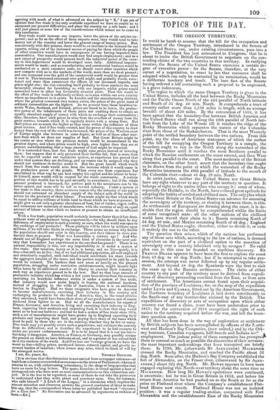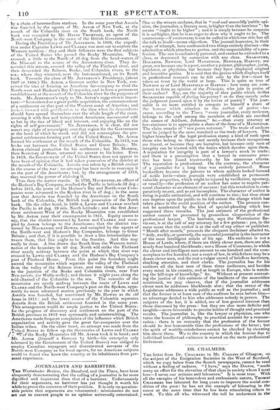TOPICS OF THE DAY.
THE OREGON TERRITORY.
IT would be harsh to assume that the bill for the occupation and settlement of the Oregon Territory, introduced in the Senate of the United States, can, under existing circumstances, pass into a law. The President has just announced to Congress, that he is about to invite the British Government to negotiate on the con- tending claims of the two countries to that territory. In ratifying treaties, the Senate of the United States exercises a certain de- gree of executive power : for the Senate, therefore, at the very outset of a negotiation, to enact by law that measures shall be adopted which can only be warranted by its termination, would be a deliberate mockery and insult. The bare fact of the Senate having ordered a bill containing such a proposal to be engrossed, is a grave indecorum.
The region to which the name Oregon Territory is given in the United States, includes all the land between the Rocky Mountains and the Pacific Ocean North of the 42d parallel of North latitude and South of 54 deg. 40 min. North. It comprehends a tract of country rather more than 1,150 miles in length, with an average breadth of about 450 miles. By the convention of 1818, it has been agreed that the boundary-line between British America and the United States shall run along the 49th parallel of North lati- tude from the Lake of the Woods till it reaches the ridge of the Rocky Mountains which separates the waters of the Columbia river from those of the Saskatchawan. That is the most Westerly point of the settled boundary between the two nations. From this point, say the class of American statesmen of which the author of the bill for occupying the Oregon Territory is a sample, the boundary ought to run to the North along the watershed of the Rocky Mountains until it reaches the most Southern parallel to which the Russian settlements on the coast extend, and then West along that parallel to the coast. The most moderate of the British claimants, on the other hand, assert that the boundary-line ought to be drawn from the point at which the watershed of the Rocky Mountains intersects the 49th parallel of latitude to the mouth of the Columbia river—about 46 deg. 19 min. North. In strict justice, neither the United States nor Great Britain have any right whatever to any part of the territory in question. It belongs of right to the native tribes who occupy it ; some of whom, especially the Haidahs, to the North, have evinced great aptitude for adopting the habits of settled and civilized men. The only plea which either Great Britain or the United States can advance for assuming the sovereignty of the territory, or sharing it between them, is this. As settlements of Europeans are forming along the coast, it is de- sirable that the region should be comprehended within the limits of some recognized state: all the other nations of the civilized world have waved their claim to it ; Russia remaining North of 54 deg. 40 min., and Mexico remaining South of 42 deg.: England and the United States ought, therefore, either to divide it, or cede it entirely the one to the other.
The question then arises, which of the nations has performed any of those acts which, according to the law of nations, is deemed equivalent on the part of a civilized nation to the assertion of sovereignty over a country inhabited only by savages ? No valid plea can in this case be founded on maritime discovery. Sir Faaricis DRAKE appears to have been the first to explore the coast from 43 deg. to 48 deg. North; but if he attempted to take pos- session, the attempt was never followed up by any regular settle- ment. And beyond 48 deg. the Spaniards were the first to visit the coast up to the Russian settlements. The claim of either country to any part of the territory must be derived from expedi- tions of discovery proceeding overland from the East, or from acts of settlement. The Americans cannot found upon their acquisi- tion of the province of Louisiana ; for, on the map of the expedition under LEWIS and CLARKE, fitted out by the American Government, the Northern boundary of Louisiana is laid down considerably to the South-east of any frontier-line claimed by the British. The expeditions of discovery or acts of occupation upon which either country can found a claim, must have been undertaken prior to 1813; for the convention of 1818 recognized the right of each nation to the territory acquired before the war, and left the boun- dary question open.
All that has been done in the way of exploration or settlement by British subjects has been accomplished by officers of the 14. arth- west and Hudson's Bay Companies, (now united,) and by the Ork- ney boatmen, Canadian voyageurs, half-breeds and Indians employment. The jealous policy of these companies has prompte dik them to conceal as much as possible the discoveries of their servants: the most important undertakings that have transpired are briefly these. In 1793, Mr. (afterwards Sir ALEXANDER) MACKENZIE crossed the Rocky Mountains, and reached the Pacific about 52 deg. North. Soon after, the Hudson's Bay Company established the fort of Alexandria, on the Fraser river, (discovered by Sir ALEX- ANDER,) about 52f deg. North. Mr. HowEs appears to have been engaged exploring this North-west territory about the same time as MACKENZIE. How long Mr. HOIVES'S operations were continued, is uncertain ; but he was in Great Britain in 1812, and before his return from America he had pushed on to the South as far as the point on Flathead river where the Company's establishment Flat- head House now stands. Flathead House was not an isolated position : it was a regular trading-station, connected with Fort Alexandria and the establishments East of the itocky Mountains
by a chain of intermediate stations. In the same year that Astoria was founded by the agents of Mr. Asron of New York, at the mouth of the Columbia river on the South bank, the North bank was occupied by Mr. DAVID Tnomesoe, an agent of the North-west Company in the name of the British Government.
During the Presidency of Mr. JEFFERSON, in 1803, the expedi- tion under Captains LEWIS and CLARKE was sent out to explore the Western territory : they and their followers were the first subjects of the United States who passed the Rocky Mountains. They crossed, a little to the North of 46 deg. from the head-waters of the Missouri to the source of the Arrowstone river. They de- scended this stream, crossed the valley of the Flathead river, and then descended the Salmon, Snake, and Columbia rivers, to the sea ; where they wintered, near the last-mentioned, on its South bank. Towards the close of Mr. JEFFERSON'S Presidency, (about 1807 or 18080 Mr. ASTOR, a German settler in New York, con- ceived the idea of forming an American fur-company to rival the North-west and Hudson's Bay Companies, and to form a permanent establishment at the mouth of the Columbia river for the purposes of trade. Mr. JEFFERSON'S reply to MT. ASTOR'S Suggestion is impor- tant—" I considered as a great public acquisition, the commencement of a settlement on that part of the Western coast of America ; and looked forward with gratification to the time when its descendants should have spread themselves over the whole length of the coast, covering it with free and independent Americans unconnected with vs but by the ties of blood and interest, and enjoying like us the rights of self-government." Mr. JEFFERSON, it is clear, did not assert any right of sovereignty over that region for the Government at the head of which he stood, and did not contemplate the pro- jected settlements forming part of the United States. Mr. ASTOR formed his settlement at the mouth of the Columbia. In 1813, war broke out between the United States and Great Britain : Mr. Asros claimed protection for his settlement ; but Mr. MONROE, then Secretary of State, returned no answer to his letter. Even in 1813, the Government of the United States does not appear to have been of opinion that it had taken possession of the district at the mouth of the Columbia. Astoria was taken by a British cruiser in the course of the war : no attempt has been made to reoccupy it on the part of the Americans; but, by the arrangement of 1818, they reserved the power of claiming it.
Thus then the matter stands. In 1793, MACKENZIE, an officer of the Hudson's Bay Company, reached the Pacific in latitude 52 deg.; before 1811, the posts of the Hudson's Bay and North-west Com- panies were advanced to the Spokan river in 47 deg.; in the same year that Astoria was founded by the Americans on the South bank of the Colombia, the British took possession of the North bank. On the other hand, in 1803-4, LEWIS and CLARKE reached the Pacific in 46 deg. 19 min. North latitude ; and the first Ame- rican settlement West of the Rocky Mountains was established by Mr. ASTOR near their encampment in 1811. Equity seems to say, that the district traversed by LEWIS and CLARKE and occu- pied by Asros belongs to the Americans ; that the district tra- versed by MACKENZIE and Howes, and occupied by the agents of the North-west and Hudson's Bay Companies, belongs to Great Britain ; and that, if it is possible to draw a line intermediate be- tween them, that line ought to be the frontier. And this may easily be done. A line drawn due South from the Western termi- nation of the boundary in 49 deg. North will strike the Flathead river nearly midway between the point at which that river was crossed by LEWIS and CLARKE and the Hudson's Bay Company's post of Flathead House. From this point the boundary might ascend the mountains which separate the valley of the Flathead from the valley of the Salmon river, and run along their crests to the junction of the Snake and Columbia rivers, near Fort Nez-perces, (or Walla-walla); and thence it might pass along the mid-channel of the Columbia to the sea. The summits of the mountains are nearly midway between the route of LEWIS and CLARKE and the North-west Company's post on the Spoken, appa- rently its most advanced station previously to the year in which Astoria was founded, but mentioned by Mr. Howes as the old house in 1811 : and the lower course of the Columbia separates Astoria from the British settlement founded in the same year. This arrangement would do ample justice to the United States : for the progress of discovery and settlement on the part of the British previous to 1813 was systematic and unintermitting. The Americans made frequent complaints of the influence which British organization and activity gave the great fur-companies over the Indian tribes. On the other hand, no attempt was made from the
nittd States to follow up the discoveries of LEWIS and CLARKE "c5*.rof the Rocky Mountains till Mr. ASTOR took it in hand ; and Mr. Asroe (himself a German by birth—his enterprise only tolerated by the Government of the United States) was obliged to employ Canadian voyageurs and discontented servants of the North-west Company as his local agents, for no American subjects could be found who knew the country or its inhabitants from per- sonal experience.



























 Previous page
Previous page